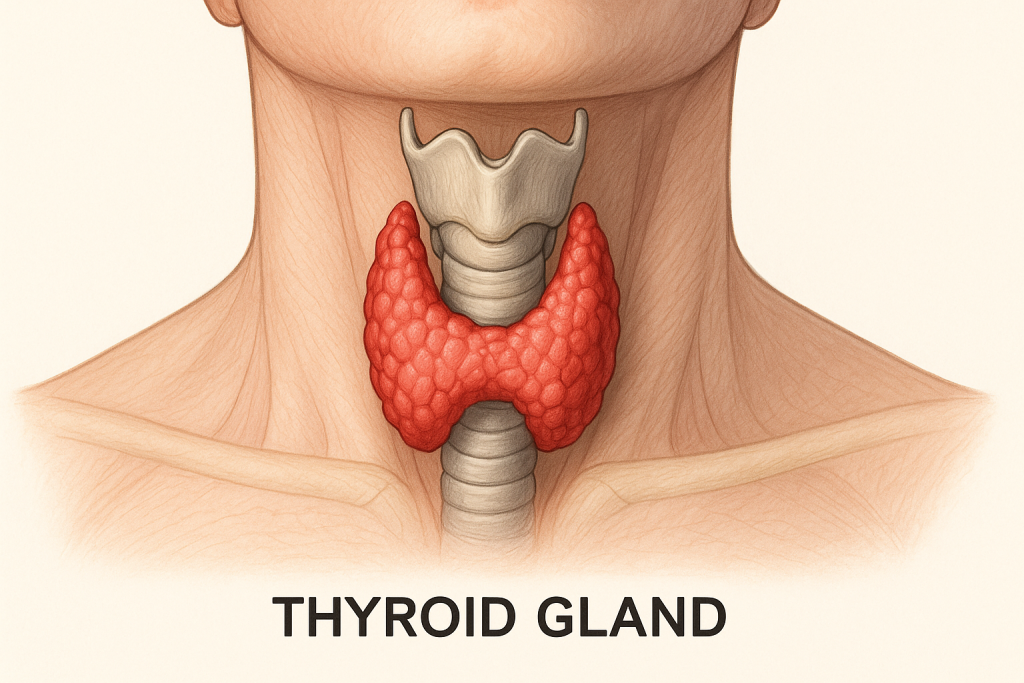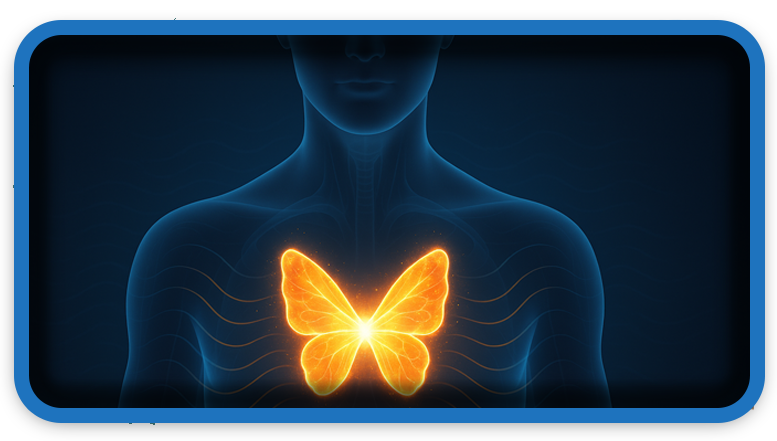⏲️ Estimated reading time: 6 min
The Thyroid Controls Everything: Your Complete Guide to Thyroid Health. The thyroid gland is small but powerful it regulates your metabolism, weight, mood, and energy. When it fails, your whole body suffers. Discover symptoms, causes, treatments, diet, and lifestyle strategies for optimal thyroid health in this complete guide.
Hidden at the base of your neck lies a small butterfly-shaped gland that silently dictates how well your body functions: the thyroid. Despite its tiny size, the thyroid controls an astonishing number of processes from how fast your heart beats, to how quickly you burn calories, to how clearly you can think.
When your thyroid is balanced, you feel energized, focused, and healthy. But when it falters, the entire body suffers. You might experience weight fluctuations, fatigue, anxiety, depression, brain fog, and a host of mysterious symptoms that often remain undiagnosed for years.
Everything you need to know about thyroid health, including:
- How the thyroid gland works.
- Common thyroid disorders like hypothyroidism and hyperthyroidism.
- Symptoms you should never ignore.
- Diagnostic tests and treatments.
- The crucial role of diet, lifestyle, and supplements.
- Mental health, weight, and metabolism connections.
- Long-term strategies to keep your thyroid healthy.
Let’s explore why the thyroid truly controls everything.
1. What is the Thyroid Gland?
The thyroid is part of the endocrine system the network of glands producing hormones that regulate essential body functions.
Located in front of your windpipe, just below the Adam’s apple, the thyroid is shaped like a butterfly with two lobes connected by a thin tissue strip called the isthmus.
Key Hormones
The thyroid produces two primary hormones:
- Thyroxine (T4) – the major hormone secreted, converted into T3.
- Triiodothyronine (T3) – the active hormone that regulates metabolism.
These hormones influence:
- Metabolism – how efficiently your body turns food into energy.
- Cardiovascular health – heart rate and blood pressure.
- Mental clarity – focus, mood regulation, and memory.
- Growth and development – especially in children.
- Temperature control – feeling hot or cold.
To make these hormones, the thyroid needs iodine, a mineral found in seafood, eggs, dairy, and iodized salt.
The Thyroid Feedback Loop
The thyroid doesn’t act alone it’s part of a chain reaction called the HPT Axis (Hypothalamus-Pituitary-Thyroid axis):
- Hypothalamus releases TRH (thyrotropin-releasing hormone).
- Pituitary gland releases TSH (thyroid-stimulating hormone).
- Thyroid gland produces T3 and T4.
This loop keeps thyroid hormones in balance. If levels drop, the pituitary sends more TSH. If they rise too high, TSH production is reduced.
2. Why the Thyroid Controls Everything
Your thyroid affects nearly every cell in your body. Here’s how:
Mental Clarity
- Healthy thyroid → sharp focus, stable mood.
- Low thyroid → brain fog, depression, poor memory.
- Overactive thyroid → anxiety, racing thoughts.
Energy and Mood
- Hypothyroidism = exhaustion, sluggishness, irritability.
- Hyperthyroidism = nervous energy, restlessness, insomnia.
Weight and Metabolism
- Low thyroid → slow metabolism, weight gain.
- Overactive thyroid → fast metabolism, unintentional weight loss.
Skin, Hair, Nails
- Low thyroid → dry skin, hair loss, brittle nails.
- Overactive thyroid → sweaty skin, thinning hair.
Reproductive Health
- Thyroid imbalance → menstrual irregularities, fertility issues, pregnancy complications.

3. Common Thyroid Disorders
3.1 Hypothyroidism (Underactive Thyroid)
Occurs when the thyroid doesn’t produce enough hormones.
Causes:
- Hashimoto’s thyroiditis (autoimmune).
- Iodine deficiency.
- Pituitary dysfunction.
- Certain medications (lithium, amiodarone).
Symptoms:
- Constant fatigue.
- Weight gain despite no lifestyle change.
- Feeling cold all the time.
- Depression, brain fog.
- Swelling in face/neck.
3.2 Hyperthyroidism (Overactive Thyroid)
Occurs when the thyroid produces too much hormone.
Causes:
- Graves’ disease (autoimmune).
- Thyroid nodules.
- Excess iodine intake.
Symptoms:
- Sudden weight loss.
- Anxiety, irritability.
- Insomnia.
- Heat intolerance, sweating.
- Tremors in hands.
3.3 Goiter
An enlarged thyroid. Can result from iodine deficiency, autoimmune disease, or nodules.
3.4 Thyroid Nodules
Lumps inside the thyroid. Most are harmless, but a small percentage can be cancerous.
3.5 Thyroid Cancer
Rare but treatable if caught early. Common types include papillary, follicular, and medullary.
4. Symptoms You Should Never Ignore
Many thyroid disorders go undiagnosed because symptoms overlap with other conditions. Red flags include:
- Unexplained fatigue.
- Sudden weight changes.
- Brain fog or poor concentration.
- Irregular menstrual cycles.
- Hair thinning or brittle nails.
- Swelling in the neck.
If you notice several of these, ask your doctor for a thyroid panel test.
5. How Thyroid Health is Diagnosed
Blood Tests
- TSH (Thyroid-Stimulating Hormone) – primary screening tool.
- Free T4 & Free T3 – active hormone levels.
- Thyroid antibodies – to detect autoimmune diseases.
Imaging
- Ultrasound – checks nodules and goiters.
- Radioactive iodine uptake – measures thyroid activity.
6. Treatment Options
6.1 Hypothyroidism
- Standard treatment → Levothyroxine (synthetic T4).
- Requires lifelong monitoring.
6.2 Hyperthyroidism
- Antithyroid drugs (methimazole, propylthiouracil).
- Radioactive iodine therapy – shrinks thyroid.
- Surgery – thyroidectomy if severe.
6.3 Supportive Care
- Adequate iodine, selenium, zinc.
- Reduce stress.
- Avoid smoking and alcohol.
7. The Thyroid and Mental Health
- Hypothyroidism → depression, apathy, poor memory.
- Hyperthyroidism → anxiety, panic, irritability.
Balancing thyroid hormones often improves mental health dramatically.
8. The Thyroid and Weight
Since metabolism is controlled by thyroid hormones:
- Hypothyroidism → weight gain, bloating.
- Hyperthyroidism → weight loss, muscle wasting.
Tips for weight control:
- Whole foods diet.
- Exercise (walking, resistance training).
- Manage stress & sleep.
9. Diet for Thyroid Health
Best Foods
- Seaweed, fish → iodine.
- Brazil nuts, sunflower seeds → selenium.
- Pumpkin seeds, beef, lentils → zinc.
- Fortified foods, sunlight → vitamin D.
Foods to Limit
- Raw cruciferous vegetables (excess goitrogens).
- Soy products (interfere with medication).
- Processed foods (sugar, refined carbs).
10. Lifestyle Habits
- Stress management (meditation, yoga).
- Sleep 7–9 hours.
- Regular but moderate exercise.
- Avoid smoking.
- Limit alcohol.
11. Living with Thyroid Disorders
Millions live normal lives with thyroid conditions. Keys to success:
- Regular check-ups.
- Consistent medication.
- Supportive lifestyle choices.
- Journaling symptoms.
12. Special Populations
- Women – especially during pregnancy/menopause.
- Children – critical for growth.
- Older People – symptoms may mimic aging.
13. Myths About Thyroid Health
- Weight gain = thyroid problem (not always true).
- Supplements can cure thyroid disorders (false).
- Only women are affected (men get them too).
14. Future of Thyroid Treatment
Researchers are exploring:
- Personalized medicine based on genetics.
- Better hormone replacements.
- Autoimmune-modifying therapies.
Final Thoughts
The thyroid might be small, but it truly controls everything. If you’ve been dealing with fatigue, mood swings, or unexplained weight changes, don’t ignore the signs your thyroid could be the missing puzzle piece.
Early diagnosis, proper treatment, and healthy lifestyle changes can help you reclaim your energy, focus, and overall well-being.
🔔 For more tutorials like this, consider subscribing to our blog.
📩 Do you have questions or suggestions? Leave a comment or contact us!
🏷️ Tags: thyroid health, thyroid symptoms, hypothyroidism, hyperthyroidism, metabolism, weight loss, mood disorders, thyroid diet, energy levels, thyroid treatment
📢 Hashtags: #ThyroidHealth, #Hypothyroidism, #Metabolism, #HormoneHealth, #WeightLoss, #MentalClarity, #EnergyBoost, #Hyperthyroidism, #Wellness, #HealthyLiving
Only logged-in users can submit reports.
Discover more from HelpZone
Subscribe to get the latest posts sent to your email.

